Individual Taxation Law Assignment - HA3042, T2 2018, University
VerifiedAdded on 2023/06/04
|9
|3179
|68
Homework Assignment
AI Summary
This document presents a comprehensive solution to a taxation law assignment, addressing key concepts such as ordinary income, deductions, and the allocation of losses from rental properties. The assignment analyzes the tax implications of lottery winnings, exploring whether annual payments constitute income under relevant legislation. It also delves into the issue of tax avoidance, examining a case involving payments made to an employee and gardener, and the court's interpretation of the substance versus form of agreements. Furthermore, the solution provides guidance on determining and allocating losses from rental properties, considering the legal interests of co-owners. The solution references relevant legislation and case law to support its arguments, providing a detailed understanding of the topics covered. The assignment addresses three questions, including the tax treatment of lottery winnings, a discussion on a payment made to an employee, and the allocation of losses from a rental property.
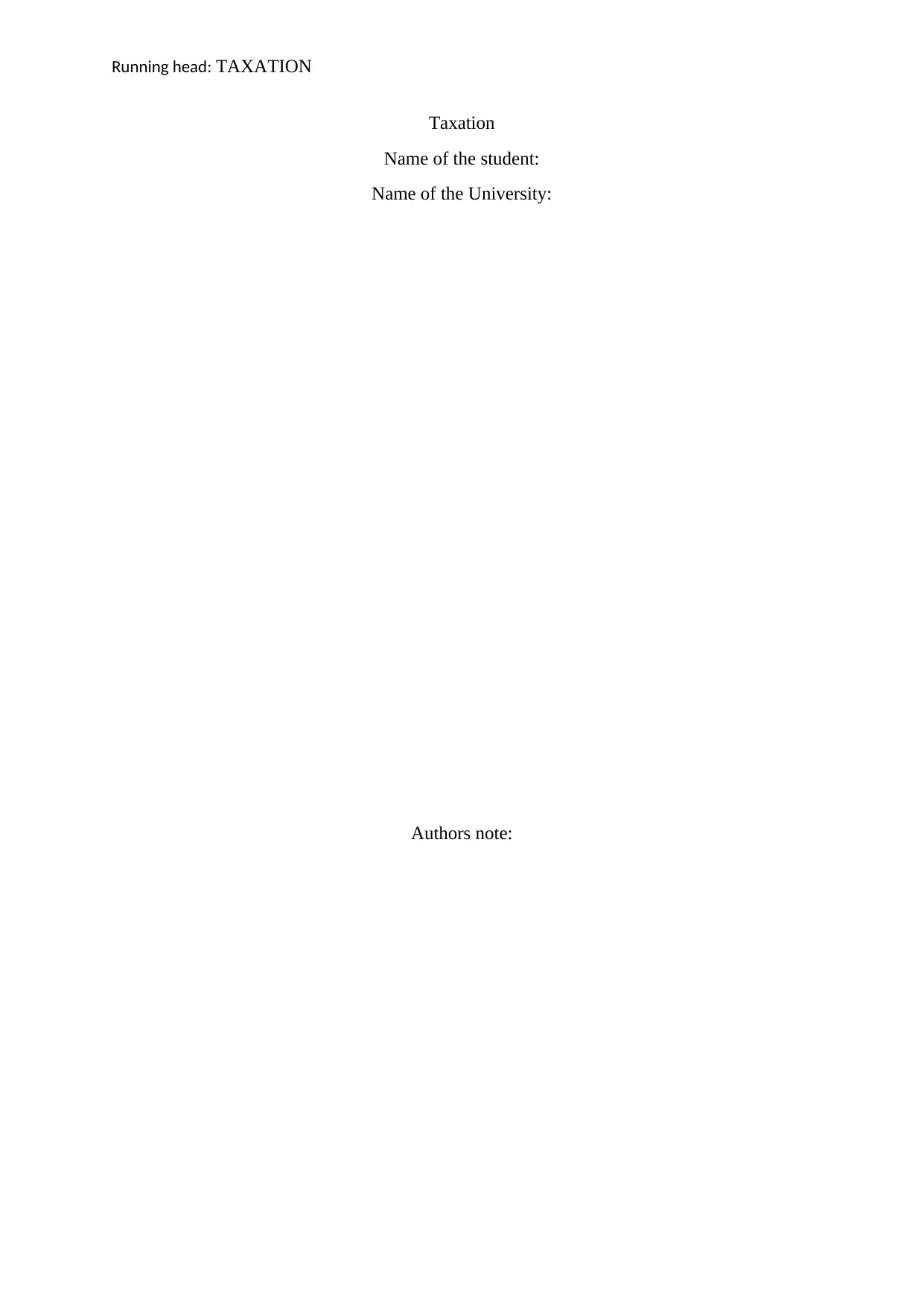
Running head: TAXATION
Taxation
Name of the student:
Name of the University:
Authors note:
Taxation
Name of the student:
Name of the University:
Authors note:
Paraphrase This Document
Need a fresh take? Get an instant paraphrase of this document with our AI Paraphraser

1TAXATION
Table of Contents
Answer to Question no. 1......................................................................................................................2
Answer to Question no. 2......................................................................................................................3
Answer to Question no. 3......................................................................................................................3
Answer to Question no. 4......................................................................................................................5
References.............................................................................................................................................7
Table of Contents
Answer to Question no. 1......................................................................................................................2
Answer to Question no. 2......................................................................................................................3
Answer to Question no. 3......................................................................................................................3
Answer to Question no. 4......................................................................................................................5
References.............................................................................................................................................7
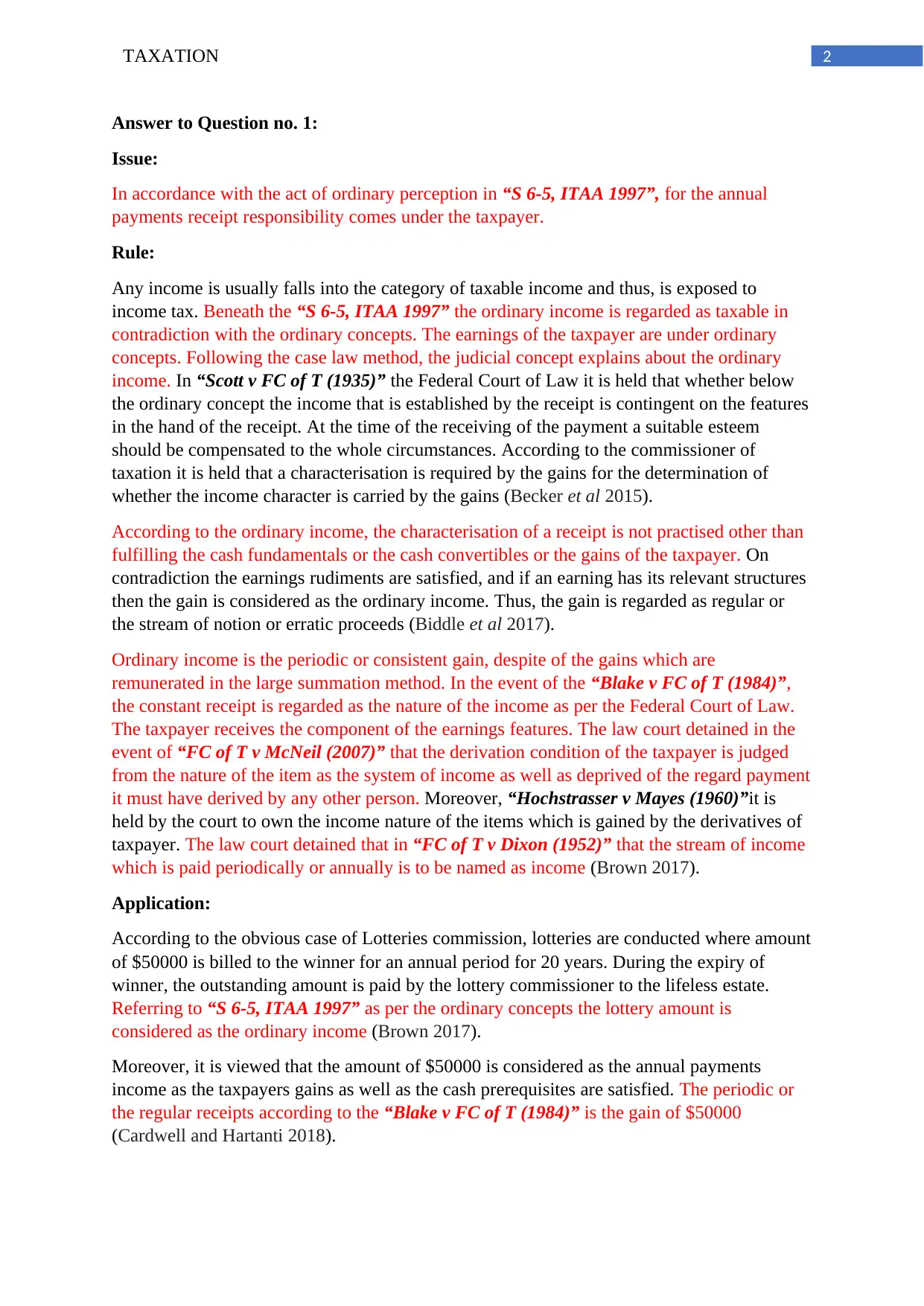
2TAXATION
Answer to Question no. 1:
Issue:
In accordance with the act of ordinary perception in “S 6-5, ITAA 1997”, for the annual
payments receipt responsibility comes under the taxpayer.
Rule:
Any income is usually falls into the category of taxable income and thus, is exposed to
income tax. Beneath the “S 6-5, ITAA 1997” the ordinary income is regarded as taxable in
contradiction with the ordinary concepts. The earnings of the taxpayer are under ordinary
concepts. Following the case law method, the judicial concept explains about the ordinary
income. In “Scott v FC of T (1935)” the Federal Court of Law it is held that whether below
the ordinary concept the income that is established by the receipt is contingent on the features
in the hand of the receipt. At the time of the receiving of the payment a suitable esteem
should be compensated to the whole circumstances. According to the commissioner of
taxation it is held that a characterisation is required by the gains for the determination of
whether the income character is carried by the gains (Becker et al 2015).
According to the ordinary income, the characterisation of a receipt is not practised other than
fulfilling the cash fundamentals or the cash convertibles or the gains of the taxpayer. On
contradiction the earnings rudiments are satisfied, and if an earning has its relevant structures
then the gain is considered as the ordinary income. Thus, the gain is regarded as regular or
the stream of notion or erratic proceeds (Biddle et al 2017).
Ordinary income is the periodic or consistent gain, despite of the gains which are
remunerated in the large summation method. In the event of the “Blake v FC of T (1984)”,
the constant receipt is regarded as the nature of the income as per the Federal Court of Law.
The taxpayer receives the component of the earnings features. The law court detained in the
event of “FC of T v McNeil (2007)” that the derivation condition of the taxpayer is judged
from the nature of the item as the system of income as well as deprived of the regard payment
it must have derived by any other person. Moreover, “Hochstrasser v Mayes (1960)”it is
held by the court to own the income nature of the items which is gained by the derivatives of
taxpayer. The law court detained that in “FC of T v Dixon (1952)” that the stream of income
which is paid periodically or annually is to be named as income (Brown 2017).
Application:
According to the obvious case of Lotteries commission, lotteries are conducted where amount
of $50000 is billed to the winner for an annual period for 20 years. During the expiry of
winner, the outstanding amount is paid by the lottery commissioner to the lifeless estate.
Referring to “S 6-5, ITAA 1997” as per the ordinary concepts the lottery amount is
considered as the ordinary income (Brown 2017).
Moreover, it is viewed that the amount of $50000 is considered as the annual payments
income as the taxpayers gains as well as the cash prerequisites are satisfied. The periodic or
the regular receipts according to the “Blake v FC of T (1984)” is the gain of $50000
(Cardwell and Hartanti 2018).
Answer to Question no. 1:
Issue:
In accordance with the act of ordinary perception in “S 6-5, ITAA 1997”, for the annual
payments receipt responsibility comes under the taxpayer.
Rule:
Any income is usually falls into the category of taxable income and thus, is exposed to
income tax. Beneath the “S 6-5, ITAA 1997” the ordinary income is regarded as taxable in
contradiction with the ordinary concepts. The earnings of the taxpayer are under ordinary
concepts. Following the case law method, the judicial concept explains about the ordinary
income. In “Scott v FC of T (1935)” the Federal Court of Law it is held that whether below
the ordinary concept the income that is established by the receipt is contingent on the features
in the hand of the receipt. At the time of the receiving of the payment a suitable esteem
should be compensated to the whole circumstances. According to the commissioner of
taxation it is held that a characterisation is required by the gains for the determination of
whether the income character is carried by the gains (Becker et al 2015).
According to the ordinary income, the characterisation of a receipt is not practised other than
fulfilling the cash fundamentals or the cash convertibles or the gains of the taxpayer. On
contradiction the earnings rudiments are satisfied, and if an earning has its relevant structures
then the gain is considered as the ordinary income. Thus, the gain is regarded as regular or
the stream of notion or erratic proceeds (Biddle et al 2017).
Ordinary income is the periodic or consistent gain, despite of the gains which are
remunerated in the large summation method. In the event of the “Blake v FC of T (1984)”,
the constant receipt is regarded as the nature of the income as per the Federal Court of Law.
The taxpayer receives the component of the earnings features. The law court detained in the
event of “FC of T v McNeil (2007)” that the derivation condition of the taxpayer is judged
from the nature of the item as the system of income as well as deprived of the regard payment
it must have derived by any other person. Moreover, “Hochstrasser v Mayes (1960)”it is
held by the court to own the income nature of the items which is gained by the derivatives of
taxpayer. The law court detained that in “FC of T v Dixon (1952)” that the stream of income
which is paid periodically or annually is to be named as income (Brown 2017).
Application:
According to the obvious case of Lotteries commission, lotteries are conducted where amount
of $50000 is billed to the winner for an annual period for 20 years. During the expiry of
winner, the outstanding amount is paid by the lottery commissioner to the lifeless estate.
Referring to “S 6-5, ITAA 1997” as per the ordinary concepts the lottery amount is
considered as the ordinary income (Brown 2017).
Moreover, it is viewed that the amount of $50000 is considered as the annual payments
income as the taxpayers gains as well as the cash prerequisites are satisfied. The periodic or
the regular receipts according to the “Blake v FC of T (1984)” is the gain of $50000
(Cardwell and Hartanti 2018).
⊘ This is a preview!⊘
Do you want full access?
Subscribe today to unlock all pages.

Trusted by 1+ million students worldwide
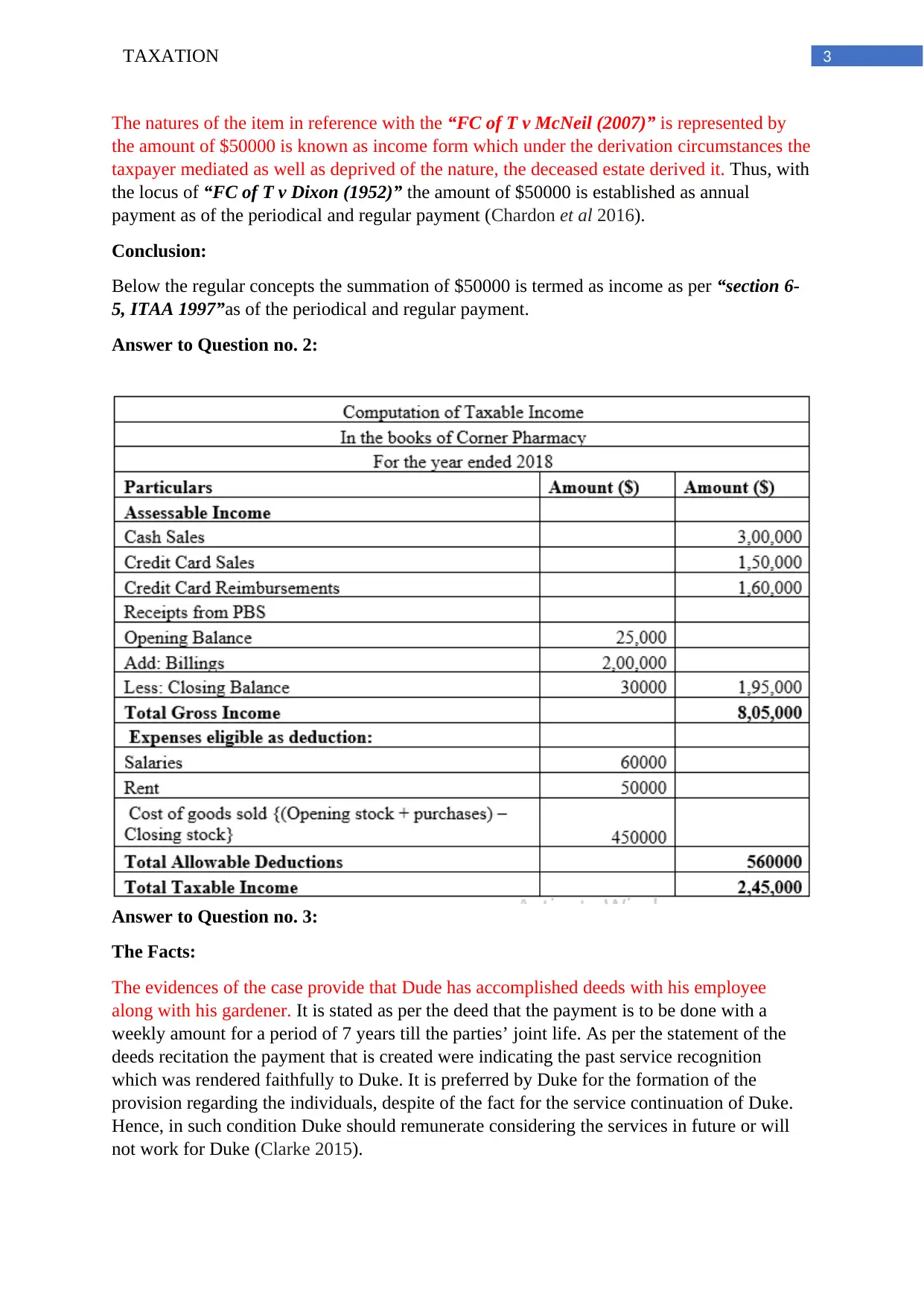
3TAXATION
The natures of the item in reference with the “FC of T v McNeil (2007)” is represented by
the amount of $50000 is known as income form which under the derivation circumstances the
taxpayer mediated as well as deprived of the nature, the deceased estate derived it. Thus, with
the locus of “FC of T v Dixon (1952)” the amount of $50000 is established as annual
payment as of the periodical and regular payment (Chardon et al 2016).
Conclusion:
Below the regular concepts the summation of $50000 is termed as income as per “section 6-
5, ITAA 1997”as of the periodical and regular payment.
Answer to Question no. 2:
Answer to Question no. 3:
The Facts:
The evidences of the case provide that Dude has accomplished deeds with his employee
along with his gardener. It is stated as per the deed that the payment is to be done with a
weekly amount for a period of 7 years till the parties’ joint life. As per the statement of the
deeds recitation the payment that is created were indicating the past service recognition
which was rendered faithfully to Duke. It is preferred by Duke for the formation of the
provision regarding the individuals, despite of the fact for the service continuation of Duke.
Hence, in such condition Duke should remunerate considering the services in future or will
not work for Duke (Clarke 2015).
The natures of the item in reference with the “FC of T v McNeil (2007)” is represented by
the amount of $50000 is known as income form which under the derivation circumstances the
taxpayer mediated as well as deprived of the nature, the deceased estate derived it. Thus, with
the locus of “FC of T v Dixon (1952)” the amount of $50000 is established as annual
payment as of the periodical and regular payment (Chardon et al 2016).
Conclusion:
Below the regular concepts the summation of $50000 is termed as income as per “section 6-
5, ITAA 1997”as of the periodical and regular payment.
Answer to Question no. 2:
Answer to Question no. 3:
The Facts:
The evidences of the case provide that Dude has accomplished deeds with his employee
along with his gardener. It is stated as per the deed that the payment is to be done with a
weekly amount for a period of 7 years till the parties’ joint life. As per the statement of the
deeds recitation the payment that is created were indicating the past service recognition
which was rendered faithfully to Duke. It is preferred by Duke for the formation of the
provision regarding the individuals, despite of the fact for the service continuation of Duke.
Hence, in such condition Duke should remunerate considering the services in future or will
not work for Duke (Clarke 2015).
Paraphrase This Document
Need a fresh take? Get an instant paraphrase of this document with our AI Paraphraser
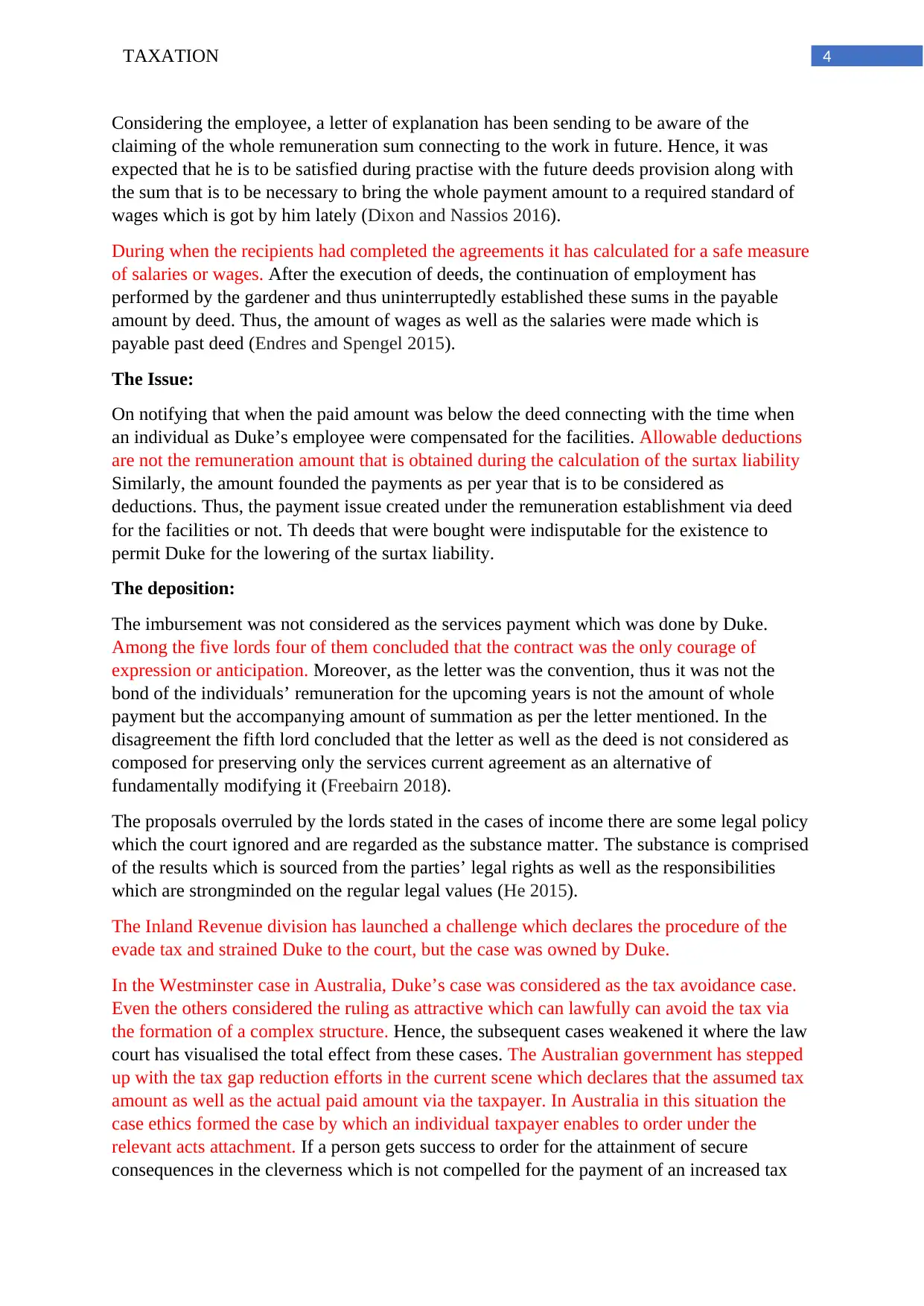
4TAXATION
Considering the employee, a letter of explanation has been sending to be aware of the
claiming of the whole remuneration sum connecting to the work in future. Hence, it was
expected that he is to be satisfied during practise with the future deeds provision along with
the sum that is to be necessary to bring the whole payment amount to a required standard of
wages which is got by him lately (Dixon and Nassios 2016).
During when the recipients had completed the agreements it has calculated for a safe measure
of salaries or wages. After the execution of deeds, the continuation of employment has
performed by the gardener and thus uninterruptedly established these sums in the payable
amount by deed. Thus, the amount of wages as well as the salaries were made which is
payable past deed (Endres and Spengel 2015).
The Issue:
On notifying that when the paid amount was below the deed connecting with the time when
an individual as Duke’s employee were compensated for the facilities. Allowable deductions
are not the remuneration amount that is obtained during the calculation of the surtax liability
Similarly, the amount founded the payments as per year that is to be considered as
deductions. Thus, the payment issue created under the remuneration establishment via deed
for the facilities or not. Th deeds that were bought were indisputable for the existence to
permit Duke for the lowering of the surtax liability.
The deposition:
The imbursement was not considered as the services payment which was done by Duke.
Among the five lords four of them concluded that the contract was the only courage of
expression or anticipation. Moreover, as the letter was the convention, thus it was not the
bond of the individuals’ remuneration for the upcoming years is not the amount of whole
payment but the accompanying amount of summation as per the letter mentioned. In the
disagreement the fifth lord concluded that the letter as well as the deed is not considered as
composed for preserving only the services current agreement as an alternative of
fundamentally modifying it (Freebairn 2018).
The proposals overruled by the lords stated in the cases of income there are some legal policy
which the court ignored and are regarded as the substance matter. The substance is comprised
of the results which is sourced from the parties’ legal rights as well as the responsibilities
which are strongminded on the regular legal values (He 2015).
The Inland Revenue division has launched a challenge which declares the procedure of the
evade tax and strained Duke to the court, but the case was owned by Duke.
In the Westminster case in Australia, Duke’s case was considered as the tax avoidance case.
Even the others considered the ruling as attractive which can lawfully can avoid the tax via
the formation of a complex structure. Hence, the subsequent cases weakened it where the law
court has visualised the total effect from these cases. The Australian government has stepped
up with the tax gap reduction efforts in the current scene which declares that the assumed tax
amount as well as the actual paid amount via the taxpayer. In Australia in this situation the
case ethics formed the case by which an individual taxpayer enables to order under the
relevant acts attachment. If a person gets success to order for the attainment of secure
consequences in the cleverness which is not compelled for the payment of an increased tax
Considering the employee, a letter of explanation has been sending to be aware of the
claiming of the whole remuneration sum connecting to the work in future. Hence, it was
expected that he is to be satisfied during practise with the future deeds provision along with
the sum that is to be necessary to bring the whole payment amount to a required standard of
wages which is got by him lately (Dixon and Nassios 2016).
During when the recipients had completed the agreements it has calculated for a safe measure
of salaries or wages. After the execution of deeds, the continuation of employment has
performed by the gardener and thus uninterruptedly established these sums in the payable
amount by deed. Thus, the amount of wages as well as the salaries were made which is
payable past deed (Endres and Spengel 2015).
The Issue:
On notifying that when the paid amount was below the deed connecting with the time when
an individual as Duke’s employee were compensated for the facilities. Allowable deductions
are not the remuneration amount that is obtained during the calculation of the surtax liability
Similarly, the amount founded the payments as per year that is to be considered as
deductions. Thus, the payment issue created under the remuneration establishment via deed
for the facilities or not. Th deeds that were bought were indisputable for the existence to
permit Duke for the lowering of the surtax liability.
The deposition:
The imbursement was not considered as the services payment which was done by Duke.
Among the five lords four of them concluded that the contract was the only courage of
expression or anticipation. Moreover, as the letter was the convention, thus it was not the
bond of the individuals’ remuneration for the upcoming years is not the amount of whole
payment but the accompanying amount of summation as per the letter mentioned. In the
disagreement the fifth lord concluded that the letter as well as the deed is not considered as
composed for preserving only the services current agreement as an alternative of
fundamentally modifying it (Freebairn 2018).
The proposals overruled by the lords stated in the cases of income there are some legal policy
which the court ignored and are regarded as the substance matter. The substance is comprised
of the results which is sourced from the parties’ legal rights as well as the responsibilities
which are strongminded on the regular legal values (He 2015).
The Inland Revenue division has launched a challenge which declares the procedure of the
evade tax and strained Duke to the court, but the case was owned by Duke.
In the Westminster case in Australia, Duke’s case was considered as the tax avoidance case.
Even the others considered the ruling as attractive which can lawfully can avoid the tax via
the formation of a complex structure. Hence, the subsequent cases weakened it where the law
court has visualised the total effect from these cases. The Australian government has stepped
up with the tax gap reduction efforts in the current scene which declares that the assumed tax
amount as well as the actual paid amount via the taxpayer. In Australia in this situation the
case ethics formed the case by which an individual taxpayer enables to order under the
relevant acts attachment. If a person gets success to order for the attainment of secure
consequences in the cleverness which is not compelled for the payment of an increased tax
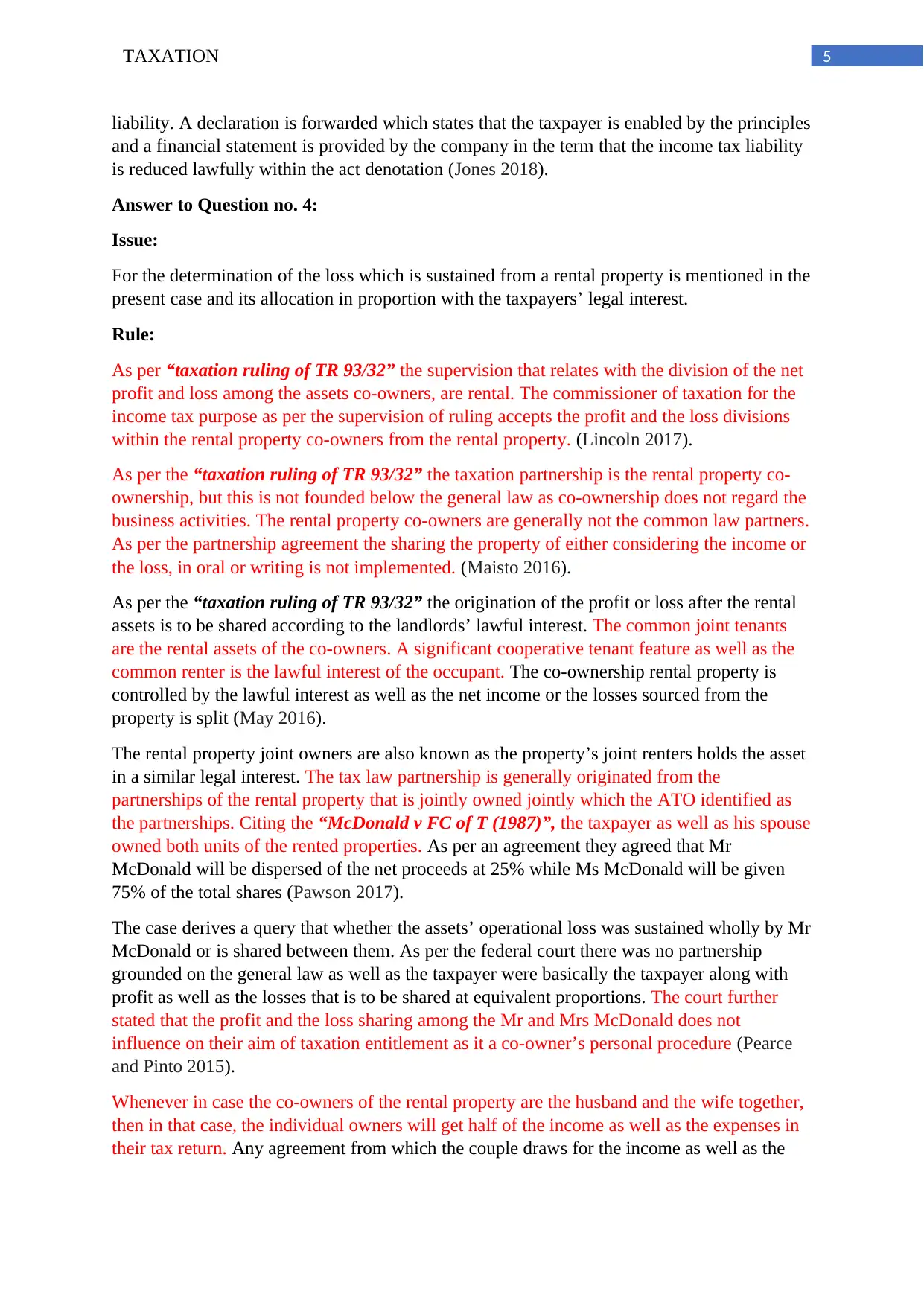
5TAXATION
liability. A declaration is forwarded which states that the taxpayer is enabled by the principles
and a financial statement is provided by the company in the term that the income tax liability
is reduced lawfully within the act denotation (Jones 2018).
Answer to Question no. 4:
Issue:
For the determination of the loss which is sustained from a rental property is mentioned in the
present case and its allocation in proportion with the taxpayers’ legal interest.
Rule:
As per “taxation ruling of TR 93/32” the supervision that relates with the division of the net
profit and loss among the assets co-owners, are rental. The commissioner of taxation for the
income tax purpose as per the supervision of ruling accepts the profit and the loss divisions
within the rental property co-owners from the rental property. (Lincoln 2017).
As per the “taxation ruling of TR 93/32” the taxation partnership is the rental property co-
ownership, but this is not founded below the general law as co-ownership does not regard the
business activities. The rental property co-owners are generally not the common law partners.
As per the partnership agreement the sharing the property of either considering the income or
the loss, in oral or writing is not implemented. (Maisto 2016).
As per the “taxation ruling of TR 93/32” the origination of the profit or loss after the rental
assets is to be shared according to the landlords’ lawful interest. The common joint tenants
are the rental assets of the co-owners. A significant cooperative tenant feature as well as the
common renter is the lawful interest of the occupant. The co-ownership rental property is
controlled by the lawful interest as well as the net income or the losses sourced from the
property is split (May 2016).
The rental property joint owners are also known as the property’s joint renters holds the asset
in a similar legal interest. The tax law partnership is generally originated from the
partnerships of the rental property that is jointly owned jointly which the ATO identified as
the partnerships. Citing the “McDonald v FC of T (1987)”, the taxpayer as well as his spouse
owned both units of the rented properties. As per an agreement they agreed that Mr
McDonald will be dispersed of the net proceeds at 25% while Ms McDonald will be given
75% of the total shares (Pawson 2017).
The case derives a query that whether the assets’ operational loss was sustained wholly by Mr
McDonald or is shared between them. As per the federal court there was no partnership
grounded on the general law as well as the taxpayer were basically the taxpayer along with
profit as well as the losses that is to be shared at equivalent proportions. The court further
stated that the profit and the loss sharing among the Mr and Mrs McDonald does not
influence on their aim of taxation entitlement as it a co-owner’s personal procedure (Pearce
and Pinto 2015).
Whenever in case the co-owners of the rental property are the husband and the wife together,
then in that case, the individual owners will get half of the income as well as the expenses in
their tax return. Any agreement from which the couple draws for the income as well as the
liability. A declaration is forwarded which states that the taxpayer is enabled by the principles
and a financial statement is provided by the company in the term that the income tax liability
is reduced lawfully within the act denotation (Jones 2018).
Answer to Question no. 4:
Issue:
For the determination of the loss which is sustained from a rental property is mentioned in the
present case and its allocation in proportion with the taxpayers’ legal interest.
Rule:
As per “taxation ruling of TR 93/32” the supervision that relates with the division of the net
profit and loss among the assets co-owners, are rental. The commissioner of taxation for the
income tax purpose as per the supervision of ruling accepts the profit and the loss divisions
within the rental property co-owners from the rental property. (Lincoln 2017).
As per the “taxation ruling of TR 93/32” the taxation partnership is the rental property co-
ownership, but this is not founded below the general law as co-ownership does not regard the
business activities. The rental property co-owners are generally not the common law partners.
As per the partnership agreement the sharing the property of either considering the income or
the loss, in oral or writing is not implemented. (Maisto 2016).
As per the “taxation ruling of TR 93/32” the origination of the profit or loss after the rental
assets is to be shared according to the landlords’ lawful interest. The common joint tenants
are the rental assets of the co-owners. A significant cooperative tenant feature as well as the
common renter is the lawful interest of the occupant. The co-ownership rental property is
controlled by the lawful interest as well as the net income or the losses sourced from the
property is split (May 2016).
The rental property joint owners are also known as the property’s joint renters holds the asset
in a similar legal interest. The tax law partnership is generally originated from the
partnerships of the rental property that is jointly owned jointly which the ATO identified as
the partnerships. Citing the “McDonald v FC of T (1987)”, the taxpayer as well as his spouse
owned both units of the rented properties. As per an agreement they agreed that Mr
McDonald will be dispersed of the net proceeds at 25% while Ms McDonald will be given
75% of the total shares (Pawson 2017).
The case derives a query that whether the assets’ operational loss was sustained wholly by Mr
McDonald or is shared between them. As per the federal court there was no partnership
grounded on the general law as well as the taxpayer were basically the taxpayer along with
profit as well as the losses that is to be shared at equivalent proportions. The court further
stated that the profit and the loss sharing among the Mr and Mrs McDonald does not
influence on their aim of taxation entitlement as it a co-owner’s personal procedure (Pearce
and Pinto 2015).
Whenever in case the co-owners of the rental property are the husband and the wife together,
then in that case, the individual owners will get half of the income as well as the expenses in
their tax return. Any agreement from which the couple draws for the income as well as the
⊘ This is a preview!⊘
Do you want full access?
Subscribe today to unlock all pages.

Trusted by 1+ million students worldwide
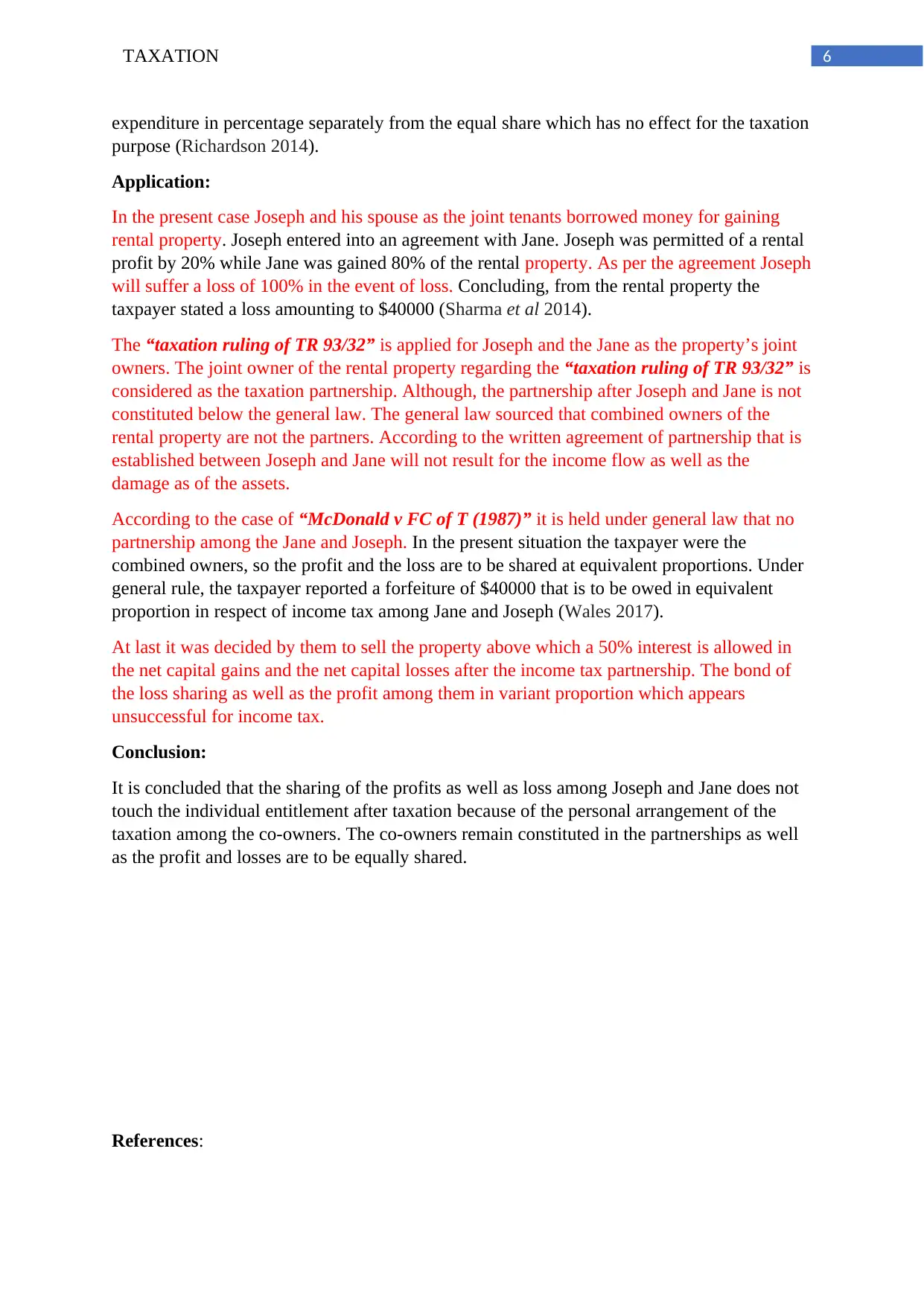
6TAXATION
expenditure in percentage separately from the equal share which has no effect for the taxation
purpose (Richardson 2014).
Application:
In the present case Joseph and his spouse as the joint tenants borrowed money for gaining
rental property. Joseph entered into an agreement with Jane. Joseph was permitted of a rental
profit by 20% while Jane was gained 80% of the rental property. As per the agreement Joseph
will suffer a loss of 100% in the event of loss. Concluding, from the rental property the
taxpayer stated a loss amounting to $40000 (Sharma et al 2014).
The “taxation ruling of TR 93/32” is applied for Joseph and the Jane as the property’s joint
owners. The joint owner of the rental property regarding the “taxation ruling of TR 93/32” is
considered as the taxation partnership. Although, the partnership after Joseph and Jane is not
constituted below the general law. The general law sourced that combined owners of the
rental property are not the partners. According to the written agreement of partnership that is
established between Joseph and Jane will not result for the income flow as well as the
damage as of the assets.
According to the case of “McDonald v FC of T (1987)” it is held under general law that no
partnership among the Jane and Joseph. In the present situation the taxpayer were the
combined owners, so the profit and the loss are to be shared at equivalent proportions. Under
general rule, the taxpayer reported a forfeiture of $40000 that is to be owed in equivalent
proportion in respect of income tax among Jane and Joseph (Wales 2017).
At last it was decided by them to sell the property above which a 50% interest is allowed in
the net capital gains and the net capital losses after the income tax partnership. The bond of
the loss sharing as well as the profit among them in variant proportion which appears
unsuccessful for income tax.
Conclusion:
It is concluded that the sharing of the profits as well as loss among Joseph and Jane does not
touch the individual entitlement after taxation because of the personal arrangement of the
taxation among the co-owners. The co-owners remain constituted in the partnerships as well
as the profit and losses are to be equally shared.
References:
expenditure in percentage separately from the equal share which has no effect for the taxation
purpose (Richardson 2014).
Application:
In the present case Joseph and his spouse as the joint tenants borrowed money for gaining
rental property. Joseph entered into an agreement with Jane. Joseph was permitted of a rental
profit by 20% while Jane was gained 80% of the rental property. As per the agreement Joseph
will suffer a loss of 100% in the event of loss. Concluding, from the rental property the
taxpayer stated a loss amounting to $40000 (Sharma et al 2014).
The “taxation ruling of TR 93/32” is applied for Joseph and the Jane as the property’s joint
owners. The joint owner of the rental property regarding the “taxation ruling of TR 93/32” is
considered as the taxation partnership. Although, the partnership after Joseph and Jane is not
constituted below the general law. The general law sourced that combined owners of the
rental property are not the partners. According to the written agreement of partnership that is
established between Joseph and Jane will not result for the income flow as well as the
damage as of the assets.
According to the case of “McDonald v FC of T (1987)” it is held under general law that no
partnership among the Jane and Joseph. In the present situation the taxpayer were the
combined owners, so the profit and the loss are to be shared at equivalent proportions. Under
general rule, the taxpayer reported a forfeiture of $40000 that is to be owed in equivalent
proportion in respect of income tax among Jane and Joseph (Wales 2017).
At last it was decided by them to sell the property above which a 50% interest is allowed in
the net capital gains and the net capital losses after the income tax partnership. The bond of
the loss sharing as well as the profit among them in variant proportion which appears
unsuccessful for income tax.
Conclusion:
It is concluded that the sharing of the profits as well as loss among Joseph and Jane does not
touch the individual entitlement after taxation because of the personal arrangement of the
taxation among the co-owners. The co-owners remain constituted in the partnerships as well
as the profit and losses are to be equally shared.
References:
Paraphrase This Document
Need a fresh take? Get an instant paraphrase of this document with our AI Paraphraser
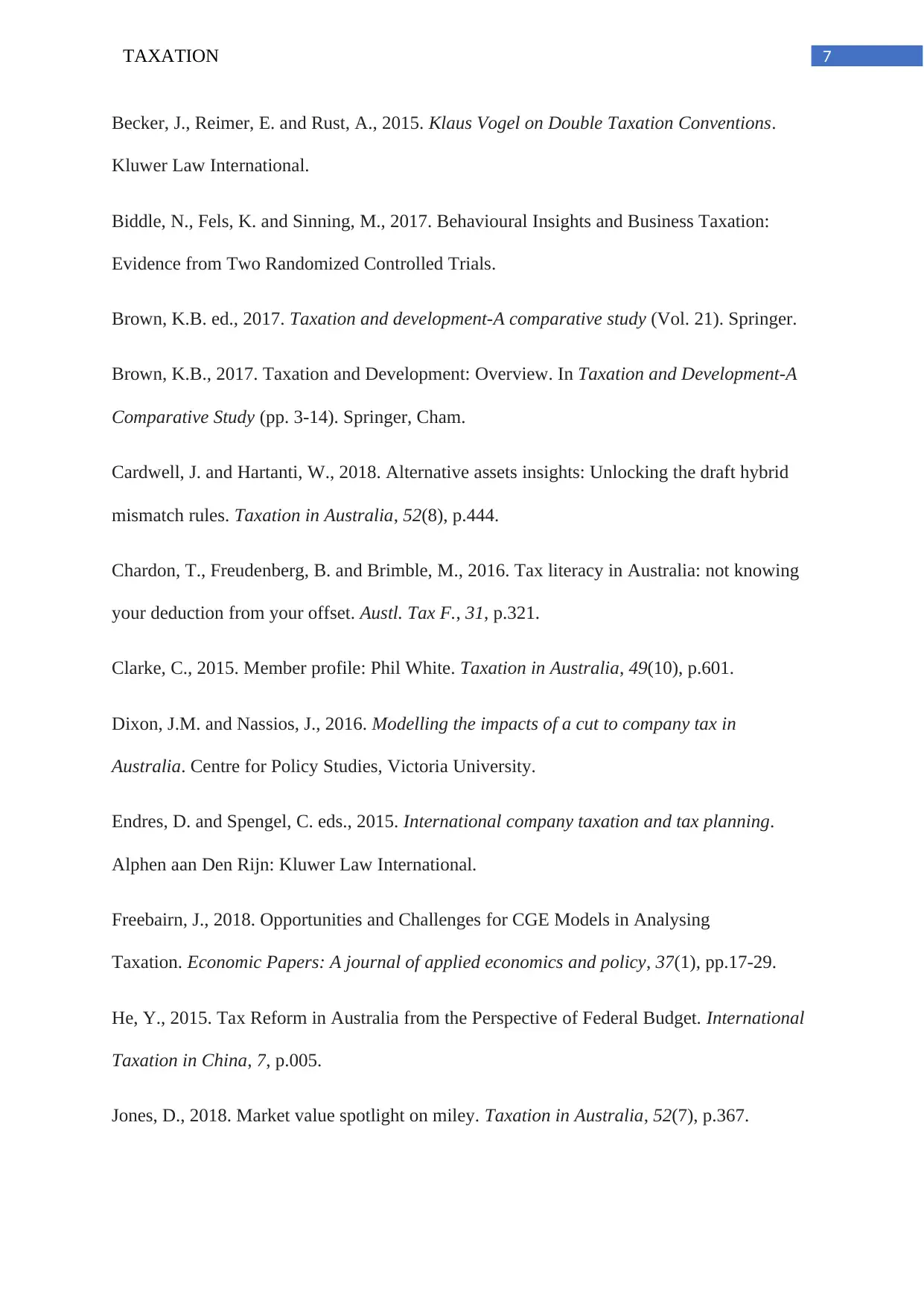
7TAXATION
Becker, J., Reimer, E. and Rust, A., 2015. Klaus Vogel on Double Taxation Conventions.
Kluwer Law International.
Biddle, N., Fels, K. and Sinning, M., 2017. Behavioural Insights and Business Taxation:
Evidence from Two Randomized Controlled Trials.
Brown, K.B. ed., 2017. Taxation and development-A comparative study (Vol. 21). Springer.
Brown, K.B., 2017. Taxation and Development: Overview. In Taxation and Development-A
Comparative Study (pp. 3-14). Springer, Cham.
Cardwell, J. and Hartanti, W., 2018. Alternative assets insights: Unlocking the draft hybrid
mismatch rules. Taxation in Australia, 52(8), p.444.
Chardon, T., Freudenberg, B. and Brimble, M., 2016. Tax literacy in Australia: not knowing
your deduction from your offset. Austl. Tax F., 31, p.321.
Clarke, C., 2015. Member profile: Phil White. Taxation in Australia, 49(10), p.601.
Dixon, J.M. and Nassios, J., 2016. Modelling the impacts of a cut to company tax in
Australia. Centre for Policy Studies, Victoria University.
Endres, D. and Spengel, C. eds., 2015. International company taxation and tax planning.
Alphen aan Den Rijn: Kluwer Law International.
Freebairn, J., 2018. Opportunities and Challenges for CGE Models in Analysing
Taxation. Economic Papers: A journal of applied economics and policy, 37(1), pp.17-29.
He, Y., 2015. Tax Reform in Australia from the Perspective of Federal Budget. International
Taxation in China, 7, p.005.
Jones, D., 2018. Market value spotlight on miley. Taxation in Australia, 52(7), p.367.
Becker, J., Reimer, E. and Rust, A., 2015. Klaus Vogel on Double Taxation Conventions.
Kluwer Law International.
Biddle, N., Fels, K. and Sinning, M., 2017. Behavioural Insights and Business Taxation:
Evidence from Two Randomized Controlled Trials.
Brown, K.B. ed., 2017. Taxation and development-A comparative study (Vol. 21). Springer.
Brown, K.B., 2017. Taxation and Development: Overview. In Taxation and Development-A
Comparative Study (pp. 3-14). Springer, Cham.
Cardwell, J. and Hartanti, W., 2018. Alternative assets insights: Unlocking the draft hybrid
mismatch rules. Taxation in Australia, 52(8), p.444.
Chardon, T., Freudenberg, B. and Brimble, M., 2016. Tax literacy in Australia: not knowing
your deduction from your offset. Austl. Tax F., 31, p.321.
Clarke, C., 2015. Member profile: Phil White. Taxation in Australia, 49(10), p.601.
Dixon, J.M. and Nassios, J., 2016. Modelling the impacts of a cut to company tax in
Australia. Centre for Policy Studies, Victoria University.
Endres, D. and Spengel, C. eds., 2015. International company taxation and tax planning.
Alphen aan Den Rijn: Kluwer Law International.
Freebairn, J., 2018. Opportunities and Challenges for CGE Models in Analysing
Taxation. Economic Papers: A journal of applied economics and policy, 37(1), pp.17-29.
He, Y., 2015. Tax Reform in Australia from the Perspective of Federal Budget. International
Taxation in China, 7, p.005.
Jones, D., 2018. Market value spotlight on miley. Taxation in Australia, 52(7), p.367.
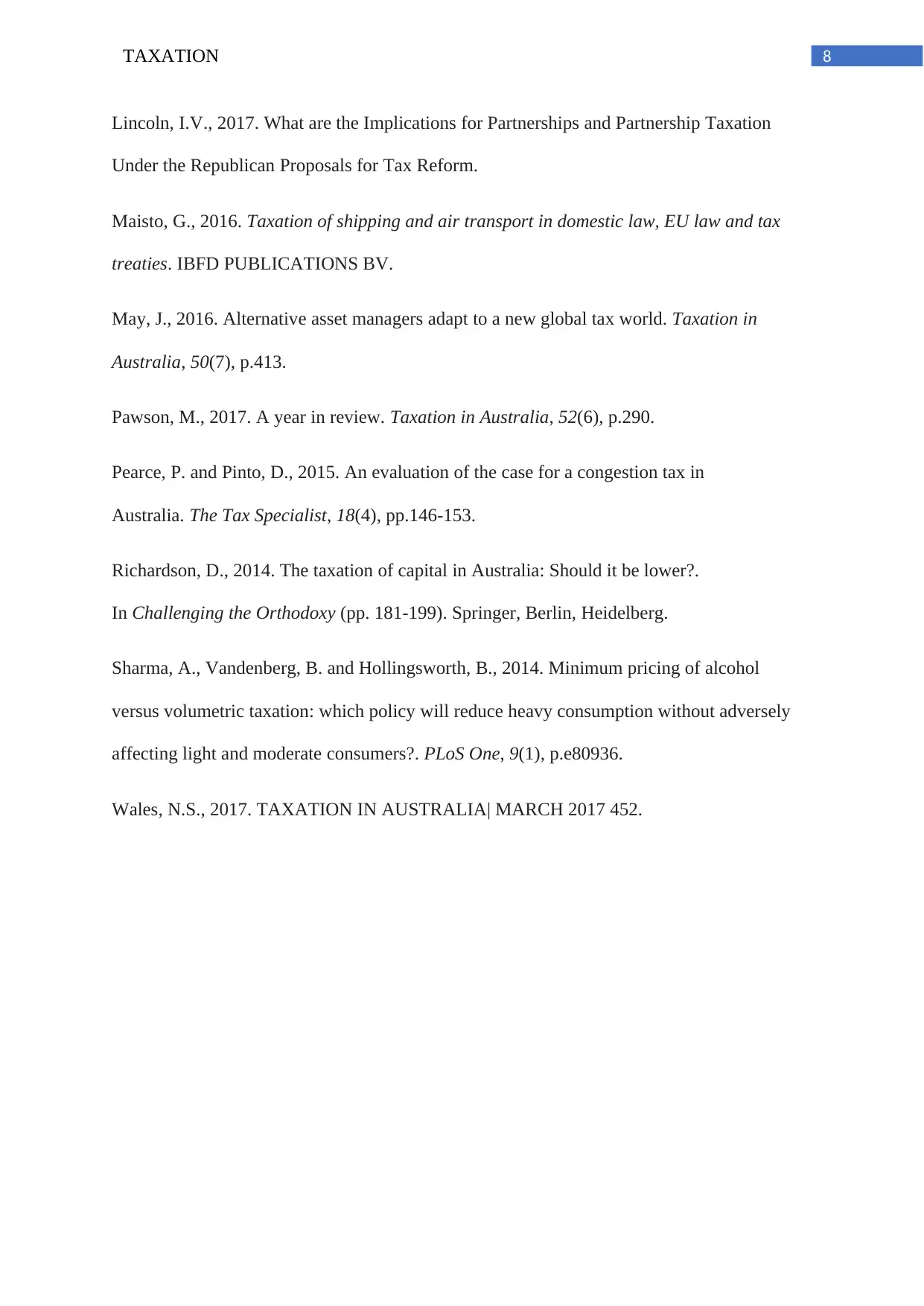
8TAXATION
Lincoln, I.V., 2017. What are the Implications for Partnerships and Partnership Taxation
Under the Republican Proposals for Tax Reform.
Maisto, G., 2016. Taxation of shipping and air transport in domestic law, EU law and tax
treaties. IBFD PUBLICATIONS BV.
May, J., 2016. Alternative asset managers adapt to a new global tax world. Taxation in
Australia, 50(7), p.413.
Pawson, M., 2017. A year in review. Taxation in Australia, 52(6), p.290.
Pearce, P. and Pinto, D., 2015. An evaluation of the case for a congestion tax in
Australia. The Tax Specialist, 18(4), pp.146-153.
Richardson, D., 2014. The taxation of capital in Australia: Should it be lower?.
In Challenging the Orthodoxy (pp. 181-199). Springer, Berlin, Heidelberg.
Sharma, A., Vandenberg, B. and Hollingsworth, B., 2014. Minimum pricing of alcohol
versus volumetric taxation: which policy will reduce heavy consumption without adversely
affecting light and moderate consumers?. PLoS One, 9(1), p.e80936.
Wales, N.S., 2017. TAXATION IN AUSTRALIA| MARCH 2017 452.
Lincoln, I.V., 2017. What are the Implications for Partnerships and Partnership Taxation
Under the Republican Proposals for Tax Reform.
Maisto, G., 2016. Taxation of shipping and air transport in domestic law, EU law and tax
treaties. IBFD PUBLICATIONS BV.
May, J., 2016. Alternative asset managers adapt to a new global tax world. Taxation in
Australia, 50(7), p.413.
Pawson, M., 2017. A year in review. Taxation in Australia, 52(6), p.290.
Pearce, P. and Pinto, D., 2015. An evaluation of the case for a congestion tax in
Australia. The Tax Specialist, 18(4), pp.146-153.
Richardson, D., 2014. The taxation of capital in Australia: Should it be lower?.
In Challenging the Orthodoxy (pp. 181-199). Springer, Berlin, Heidelberg.
Sharma, A., Vandenberg, B. and Hollingsworth, B., 2014. Minimum pricing of alcohol
versus volumetric taxation: which policy will reduce heavy consumption without adversely
affecting light and moderate consumers?. PLoS One, 9(1), p.e80936.
Wales, N.S., 2017. TAXATION IN AUSTRALIA| MARCH 2017 452.
⊘ This is a preview!⊘
Do you want full access?
Subscribe today to unlock all pages.

Trusted by 1+ million students worldwide
1 out of 9
Related Documents
Your All-in-One AI-Powered Toolkit for Academic Success.
+13062052269
info@desklib.com
Available 24*7 on WhatsApp / Email
![[object Object]](/_next/static/media/star-bottom.7253800d.svg)
Unlock your academic potential
Copyright © 2020–2026 A2Z Services. All Rights Reserved. Developed and managed by ZUCOL.




